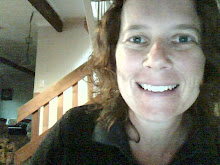
My youngest child turns 6 this week, so we're gearing up for a very girly dancing birthday party on the weekend. I had suggested she invite 6 friends, she insisted that you couldn't have a party with anything less than 10, so by the time her brothers invite a friend for survival, I think I'm catering for around 15. Funny how the boys never argued about the size of the party. My eldest had his first sleepover party this year, when he and 3 friends slept in the tent. Of course, the little princess wanted a sleepover party too, but Dad and I firmly said "When you're ten too...", so we've survived that joy for much later.
I know this party will be horrendously tiring, well for me anyway. There will be some fancy cake to try and design from a round tin, square tin or ring tin, or some intricate combination of these. Then there's the pinata. I made a pinata for each of the boys when they turned 6, both of which turned out being a lolly fortress that had to be cut open. I'm actually hoping she won't remember that one. There will be the party games to think of, the yard to tidy up (and boy does that need some attention before the big day) and the party bags to make. Then there's the end-of-party/I'm-really-tired tantrum to survive when it's all over and I'm surrounded by a mess. But I'll do it anyway, because I know how special birthday parties make kids feel.
The beauty of birthday parties is that they celebrate milestones. Long ago milestones were celebrated for whole weeks with feasts and festivals and the entire community joined in. Reaching a certain age came with certain privileges and responsibilities. Young people grew into adulthood through a series of steps where adults guided their thinking and behaviour. As education has become more formalised, I think much of that social education has been lost, and that's why we see young men in their early 20's still acting like teenagers and putting their own lives and those of others at risk.
I'm not saying we should return to initiation rites or anything like that, but as a parent it makes me think about the question, "How am I breaking the passage to adulthood into steps?"
Such deep thinking like this will have to wait until I've make my "pin the crown on the princess" game.
Such deep thinking like this will have to wait until I've make my "pin the crown on the princess" game.



